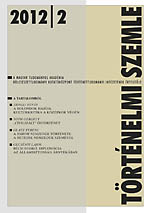Bécsi fiaskó. Diplomácia az állambiztonság árnyékában:a „Teleki–Kertész-ügy” – 1958
Fiasco at Vienna. Diplomacy in the Shadow of State Security: the “Teleki–Kertész Affair” – 1958
Author(s): Lajos GecsényiSubject(s): History
Published by: Magyar Tudományos Akadémia Bölcsészettudományi Kutatóközpont Történettudományi Intézet
Summary/Abstract: Within the framework of the Hungarian state security the various secret services specialising in intelligence and counter-espionage came into existence gradually after the communist takeover in 1948. Their area of operation soon extended over the Ministry of Foreign Affairs and the Hungarian embassies abroad. Their fellows, as in all countries in the world, were also employed by the embassies immediately in a diplomatic status. The Hungarian secret services established at the Hungarian embassy at Vienna a department, a so-called residence, as early as 1950. One of its major tasks was to observe the emigrees living in Austria and to subvert emigrant organisations. After the Revolution of 1956 the relations between the two neighbouring countries reached a nadir. The reconstruction of the mine barrage along the border, the reception of tens of thousands of Hungarian refugees, and the unjust accusations against Austria with regard to the support given to the revolutionaries, could not fail to have a serious negative effect on the relationship between Vienna and Budapest. Yet, in fact, both countries were interested in the solution of the problems, and it was also urged for from the background by Soviet foreign policy. The way out from the conflict was long and difficult. The first important step was the meeting in November 1957 at Vienna of the two ministers of foreign affairs, where it was agreed upon that negotiations would be started. Yet it soon became evident that the opinions seriously diverged on the method and content of these negotiations. Solution was slowly outlined in the course of foreign consultations, although the revelation of the activities of Hungarian state security agents in Austria repeatedly exerted a harmful influence on the atmosphere of negotiations. An especially grave incident took place in May 1958 at Vienna, when a state security officer, with a diplomatic passport, was assisted by the first secretary of the Hungarian embassy (in fact, an officer of the secret police himself) in trying to blackmail a well-known Hungarian emigree, former MP, and Austrian secretary of the so-called UN Committee of Five, into cooperation. Upon orders by Oscar Helmer, minister of home affairs, the Austrian counter-espionage service not only prevented the action but immediately publicised it, which led to a storm of public indignation. Due to the gravity of the affair, the Austrian government dealt with it in two sessions (one of them extraordinary), looking for the means of a peaceful solution to the crisis. The Hungarian Ministry of Foreign Affairs, on the other hand, took a deliberately provocative stance, falsifying the course of events and refusing to accept the facts themselves, which in the end led to the expulsion of the two pseudo-diplomats. After the leaders of the foreign affairs in both countries had considered the possible consequences of an escalation of the crisis, the conflict was apeased, but
Journal: Történelmi Szemle
- Issue Year: 2012
- Issue No: 02
- Page Range: 315-336
- Page Count: 22
- Language: Hungarian

